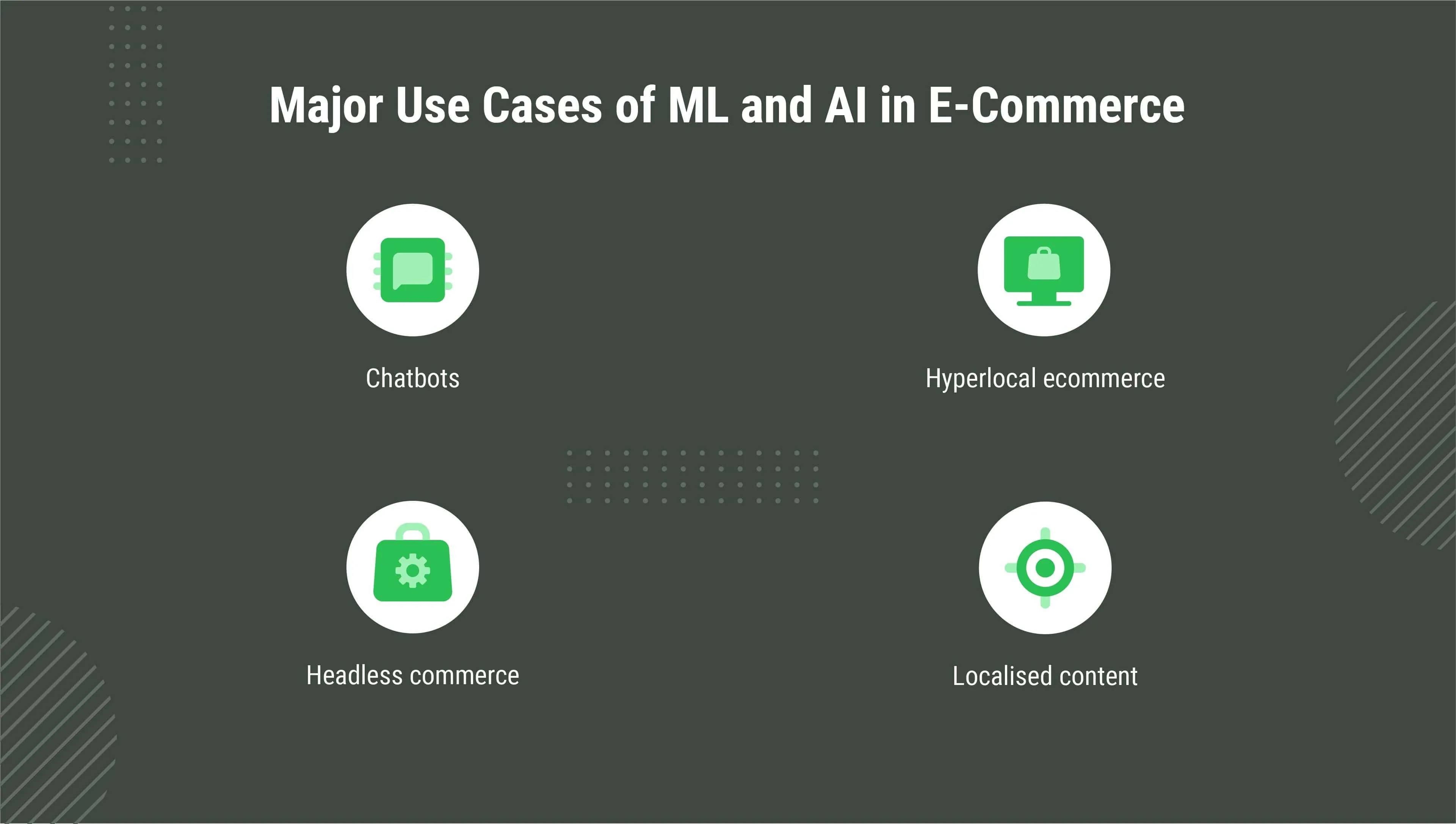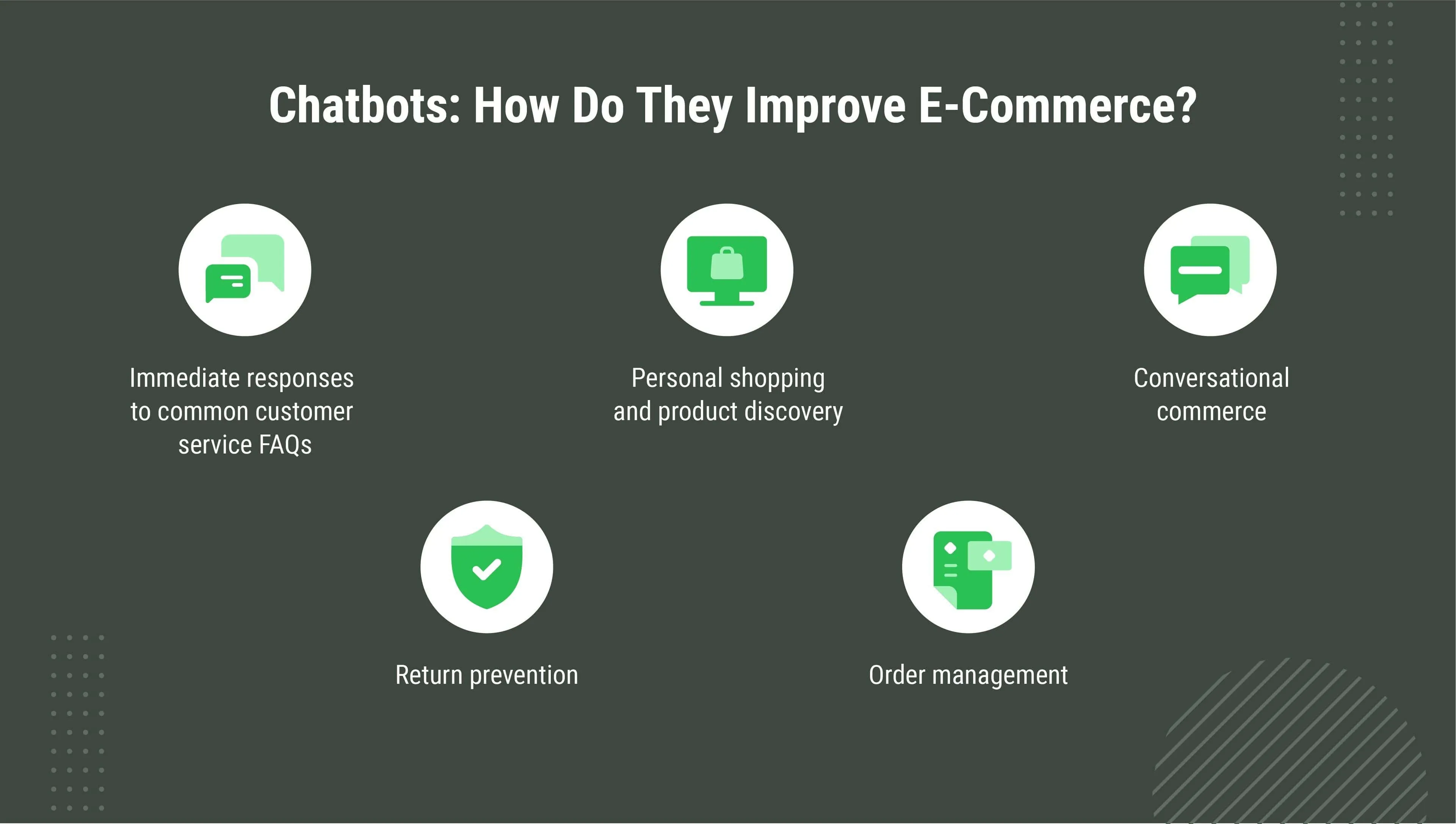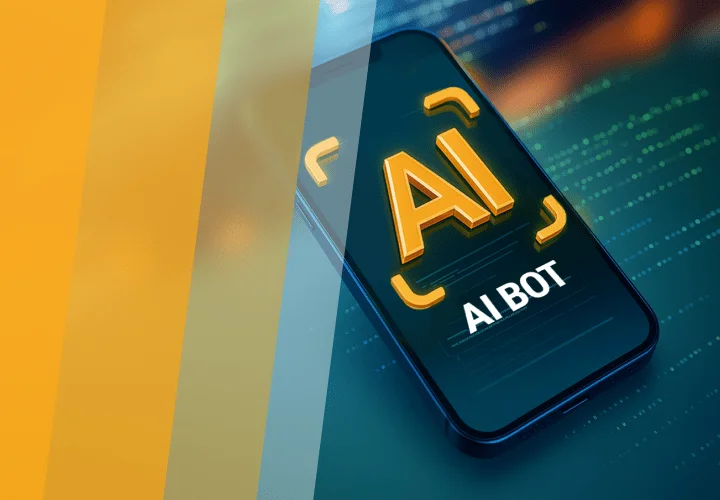How ML, AI, AR, and Chatbots Attract Buyers to Your E-Commerce Store
Table of contents
We live in a time when innovations develop with remarkable speed and become available more than ever before. Meanwhile, the world situation pushes them forward, making businesses adopt innovative technologies to survive in the competitive market, and e-commerce is no exception.
The current world situation with the COVID-19 outbreak, which caused isolation measures and quarantine, is another crucial driver for the adoption of advanced technological solutions by the E-commerce industry. And in this article, we’ll take a close look at how such innovations as AI and ML, AR, and chatbots help businesses to remain competitive at the hardest of times.
So let’s not beat around the bush and start exploring their impact on the shopping experience and business development.
ML and AI Technology in E-Commerce
The advance of technologies today allows businesses to go beyond addressing real-world issues, covering such complicated and hard-to-measure things like customer satisfaction. And because the COVID-19 outbreak has led to the highest rates of technology adoption for E-commerce purposes, it is predicted that by 2025, AI and ML technologies will control about 95% of all customer interactions.
Because AI and ML are known for helping E-commerce companies with the personalization of services, the use of these technologies leads to increased sales. The growth in sales becomes possible with a product recommendation based on a user's browsing history and buying patterns.
What's more, AI and ML allow industry players to invent new strategies of communication with customers and keep them engaged. And with the extremely accurate data produced by AI and ML, it becomes possible to enhance the existing strategies, whether the talk is about personalized replies to customer inquiries, tailored alerts on shopping deals, or reminders on the created wish lists. Also, these technologies perfectly align with successful strategies for finding new customers.
ML and AI in E-Commerce: Examples and Benefits
So let’s dig deep into how AI and ML are revolutionizing the e-commerce industry. Here are the major use cases of these techs:

Chatbots
Chatbots allow E-commerce platforms to automate interactions with customers, also adding to more personalized experiences, whether with the help of textual or auditory methods. To be more exact, these are exactly chatbots that allow E-commerce stores to provide 24x7 assistance.
The important thing to mention here is that these bots not just help with customer queries, but also positively affect buying decisions of users, contributing to the clarity and better navigation on websites with lots of products on offer.
One more advantage chatbots have on offer is the ability to gather customer input, analyze it, and provide valuable info for better decisions.
We’ll get back to chatbots later to view this technology and its beneficial impact on business. And now, let’s explore the next brilliant use case of AI and ML in E-commerce.
Hyperlocal E-commerce
We live in a time when hyperlocal commerce is on the rise: it's widely used by E-commerce businesses for the creation of multiple sub-stores under customer geo-location data, in this way allowing to carter the unique needs of every individual customer group. This contributes to a better shopping experience and faster delivery of goods - both highly valued issues. Moreover, hyperlocal commerce serves as a booster to sales by offering bestsellers to users based on the local demand analysis.
Headless commerce
Used for the delivery of a sound content experience and efficient management of the functionality, headless commerce serves as a good add-in to an E-commerce solution. It can be used by a variety of E-commerce business lines, whether brands that place a focus on the delivery of experiences, companies selling lifestyle products, brands that promote with influencers, etc. - applied as a part of business strategy, it allows creating seamless and personalized shopping experience, unique brand identity, and delivery of customized services.
Localized content
Localized content is a powerful tool in E-commerce that allows businesses to reach wider audiences without any hindrance of location or language. The thing is that multilingual e-commerce solutions allow automatically translating a website into hundreds of languages, just in a few clicks.
There is no doubt that Artificial Intelligence and Machine Learning will continue to assist E-commerce businesses in the areas of website and app optimization, customer experience, personalized services, customer relationship management, warehousing management, etc. Since AI and ML keep evolving, they will continue to benefit the E-commerce industry.
But AI and ML are not the only contributors to the efficiency of E-commerce. So now, let’s see what’s the impact of Augmented Reality on the sector.
AR Technology in E-Commerce
The use of augmented reality in E-commerce solutions gives consumers an immersive experience, allowing them to have real-time interaction with products while remaining in their own environment. An example of such a solution is the AR Shopping App designed by Emerline for driving shoe sales.
AR bridges the gap between physical stores and online shopping experiences. This gap is felt even wider due to the Covid-19 pandemic that restricts retail shops from being open and leaves consumers unable to enter stores and physically handle products.
So how exactly does AR help E-commerce businesses to survive in this complicated period?
Brilliant Use Cases of AR in E-Commerce
While various researches highlight how augmented reality can not only increase engagement but also have a significant impact on conversions for E-commerce brands, Deloitte has gone one step further by claiming that 40% of shoppers would even pay more for a product if they were able to test it through AR technology. And here are some brilliant examples of how an E-commerce business can benefit from the use of AR today.
L’oreal

L’Oreal is not just one of the leading players in the beauty industry but also one of the Beauty Tech companies in the world. L'oreal has undergone a digital transformation that resulted in the delivery of augmented products and services.
After the company acquired AR try-on technology known as ModiFace, it witnesses acceleration of sales, and highly increased conversion rates. The technology has literally transformed the consumer experience, allowing users to try on virtual makeup and hair color. But things didn't end there. In addition, AR opened up space for skin diagnosis and skin shade assessments.
The adoption of innovation by the company ensured its strong position during the COVID-19 outbreak. The 2020 annual report by L’Oreal states that the beauty company saw a ‘remarkable development’.
DFS
The leading sofa retailer in the UK with more than a hundred showrooms has launched the largest web-based AR solution in 2020, and after the implementation has reaped outstanding results. By offering their customers an opportunity to try on more than 10 thousand sofas and see how they fit their homes, the retailer easily survived the crisis caused by the pandemic. To be exact, the use of AR and 3D technology allow the company to not just keep but increase the conversion rates up to 112% in December 2020.
ASOS
ASOS, an E-commerce retailer with over 22.3 million active customers and more than 85000 products on offer, accelerated the use of AR technology during the Covid-19 pandemic to eliminate the need in shooting products in a studio. In collaboration with Zeekit, the company took advantage of AR to simulate real-life photography of more than 500 products on different models each week.

The conclusion we can make after viewing these brilliant examples of AR use in e-commerce is that the technology allows bringing the desired level of satisfaction with the shopping experience even when it takes place at home, or anywhere else. But it’s always possible to make it even greater. For example, with the use of chatbots.
Leveraging Chatbots to E-Commerce Stores
The need for E-commerce chatbots has never been higher than it is today. In fact, McKinsey states that 5 years of digital technology adoption by customers and businesses occurred in just 8 weeks of COVID-19.
What are the top use cases for E-commerce chatbots?
E-commerce companies can leverage chatbots to streamline the entire customer journey. Here are our favorite use cases:

Immediate responses to common customer service FAQs
Customer service chatbots are considered to be one of the most widespread use cases for AI, and the E-commerce sector is no exception. They cover a range of issues, from product care and return policies to warranty information and troubleshooting. Providing immediate answers to common questions, E-commerce chatbots significantly save a user's time, which makes this technology highly wanted and beneficial to business.
Personal shopping and product discovery
AI-powered chatbots define customer preferences and generate personal product recommendations. They also become a number one solution during the holiday shopping season, helping users to find the perfect gift for everyone based on price range, interests, and other criteria.
Conversational commerce
Chatbots are known for providing a seamless add-to-cart and checkout experience that takes place during a conversation.
Return prevention
Studies show that over 30% of all online purchases are returned. So, when a user shows behavior that indicates a return is likely to take place, a chatbot can preemptively intervene to prevent a return from ever happening. For example, a user can add two same items in the cart but in different sizes, and a chatbot can intervene to help in choosing the right size.
Order management
Human agents should not be involved in such mundane tasks as making small changes to an order or tracking the status of delivery because it is costly and often results in wait times, longer resolution times, and increased customer frustration. So chatbots can serve as an assistant to the completion of such tasks.
The Bottom Line
If you are looking for some advanced technologies to implement in your E-commerce business, the above-mentioned innovations that redefine online shopping while providing a fantastic experience for both buyers and sellers can become a good choice. Whether it is the use of AI and ML, chatbot development, or AR implementation, our R&D (Research and Development) teams will help you to make sure that the solution you are interested in is capable of bringing the desired results.
Have some questions? Feel free to contact us!
Published on Apr 9, 2023





